Services on Demand
Article
Indicators
Related links
-
 Cited by Google
Cited by Google -
 Similars in Google
Similars in Google
Share
South African Journal of Science
On-line version ISSN 1996-7489
Print version ISSN 0038-2353
S. Afr. j. sci. vol.112 n.9-10 Pretoria Sep./Oct. 2016
http://dx.doi.org/10.17159/sajs.2016/a0178
NEWS AND VIEWS
http://dx.doi.org/10.17159/sajs.2016/a0178
National Research Foundation celebrates science excellence for development
Thalia Brussow
National Research Foundation, Pretoria, South Africa
Knowledge is the currency of a thriving economy. Generating and engaging with that knowledge delivers innovative ideas that empower and sustain nations. That is why the National Research Foundation (NRF) of South Africa annually celebrates the work of our country's finest researchers through the NRF awards.
The NRF awards recognise South African scientists for their achievements as indicated through the NRF rating system. In addition to the rating-linked awards, special recognition awards provide a platform to honour researchers for career achievements and contributions to knowledge creation and dissemination, as well as for capacity development and transformation in the National System of Innovation. This year's awards ceremony took place on 1 September 2016 in Limpopo.
The men and women celebrated through the awards are in various stages of their research development - some have shown outstanding academic performance in their final year of PhD study, while others have been contributing to the National System of Innovation for the bigger part of their careers and are deemed to be international leaders in their fields. Yet despite their differences, this cohort has something very important in common - without their valuable work, we would not be able to advance humanity's body of knowledge or secure a brighter future for all South Africans.
Speaking at the awards the Minister of Science and Technology, Mrs Naledi Pandor, noted that South Africa has a scientific heritage to be proud of and that 'We have made a disproportionate contribution to scientific research worldwide, considering our relatively small economy'.
Minister Pandor further observed that South Africa faces a challenge when it comes to training and retaining scientists and researchers:
Significant investment is required in both human development and research infrastructure at universities both to increase the productivity of the system and to support the development of research capacity at formerly black universities and universities of technology.
Our challenge is to address gender and racial imbalances in the make-up of our science and technology workforce. We not only want to encourage more students to embark on science and engineering studies, but we are also making plans to sustain their ability to pursue research careers. More than ever, international fellowship and bursaries will be important if we are to achieve our target of producing 5000 doctorates per annum, 3000 of which should be in science, engineering and technology fields.
By recognising the research talent that South Africa has, the NRF hopes to encourage the next generation of scientists to develop their own talents as well as to promote the public's understanding of and engagement with science.
Special Awards
Seven Special Awards were presented to eight individuals and one higher education institution.
Nominations for the Special Awards were received from South African higher education institutions. The nominations were then evaluated by an expert panel which made recommendations to the NRF's Corporate Executive which made the final decision.
For the Excelleration Award, the NRF makes use of data that is supplied by the Centre of Excellence in Scientometrics and Science, Technology and Innovation Policy (SciSTIP) to select the winning institution.
Research Excellence Award for Next Generation Researchers
The Research Excellence Award for Next Generation Researchers is awarded to full-time final-year NRF-funded doctoral students (one woman and one man) who have achieved outstanding academic performance, and demonstrated the potential for contributing significantly to the National System of Innovation. This year's recipients were: Dr Pragashnie Govender (Health Sciences, University of KwaZulu-Natal) and Mr Sooraj Baijnath (Pharmaceutical Chemistry, University of KwaZulu-Natal).
Research Excellence Award for Early Career/Emerging Researchers
The Thuthuka funding instrument is central to the NRF's human capital development strategy and aspires to improve the research capacities of designated researchers with the ultimate aim of redressing historical imbalances. The Research Excellence Award for Early Career/Emerging Researchers award recognises two post-PhD Thuthuka grantholders (one woman and one man) who have achieved exceptional research performance. The awardees this year were: Prof. Nosipho Moloto (Chemistry, University of the Witwatersrand) and Prof. Mark Engel (Medical Sciences, University of Cape Town).
Excellence in Science Engagement Award
This award recognises an individual in the research community at a South African higher education institution or science council who has made an outstanding contribution to public engagement with and understanding of various areas of science over a sustained period. This year the Excellence in Science Engagement Award went to Prof. Lee Berger (Human Evolution, University of the Witwatersrand).
NRF Excelleration Award for South African Research Institutions
Derived from the words 'excellence' and 'acceleration', the Excelleration Award acknowledges South African research institutions for achieving the most improved research performance over recent years, measured against a selection of critical indicators. This year the award went to the University of South Africa. The University of South Africa also received a prize sponsored by Thomson Reuters.
Hamilton Naki Award
This award recognises an individual for outstanding efforts to advance their career in science, and for achieving world-class research performance, despite considerable equity challenges. This award was named after Mr Hamilton Naki, a self-taught surgeon who developed his career against all odds. The recipient of the 2016 award was Prof. Lerothodi Leeuw (Astrophysics, University of South Africa).
Champion of Research Capacity Development and Transformation at South African Higher Education Institutions Award
This award is awarded to individuals within the research community who contribute to the transformation of South Africa's community and landscape.
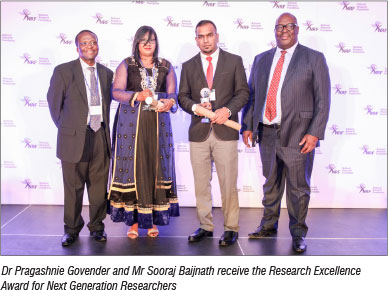
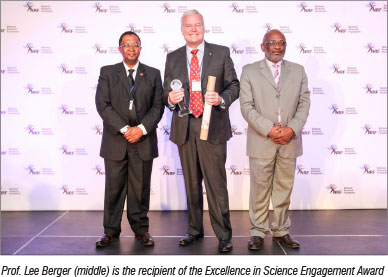
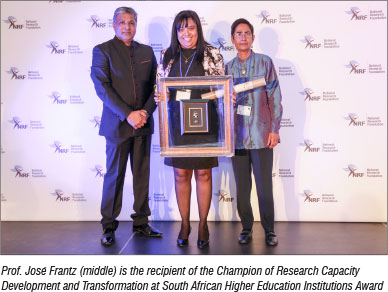
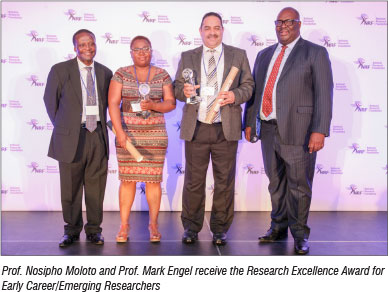
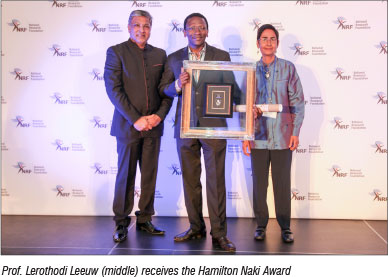
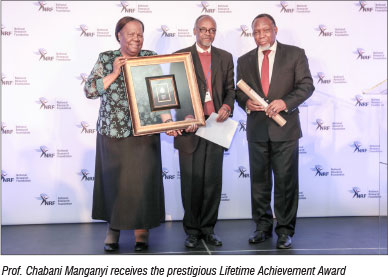
The award is dependent on the number of students in the designated groups who had been trained, as well as the quality and impact of research outputs of the students. Prof. José Frantz (Physiotherapy, University of the Western Cape) received this award in 2016.
Lifetime Achievement Award
The NRF's most prestigious award honours a deserving South African individual who is considered to have made outstanding or extraordinary contributions, of international standing and impact, to the development of science in and for South Africa over an extended period of time.
For his contribution as a psychologist, a scholar, a leader in higher education, a key role player in the transformation of the South African education system, a biographer, a gentle intellectual with an enduring love for this country and its people, Prof. Chabani Manganyi was awarded the Lifetime Achievement Award.
In recent years, Prof. Chabani Manganyi has also been acknowledged through honorary doctorates from the University of the Witwatersrand and the University of South Africa, and has received a certificate of acknowledgement from Rhodes University.
NRF ratings-based awards
At the ceremony, awards were also given to researchers who earned A- and P-ratings.
The ratings are awarded through the peer-review based NRF rating system. In order to receive a rating, researchers have to apply and submit evidence of their work. Assessing the work of applicants is a rigorous process that involves a network of peer reviewers, 22 specialist committees, five externally appointed chairpersons and five assessors, the Executive Evaluation Committee and the Appeals Committee.
Ratings are awarded based on the quality of a researcher's work. Reviewers do not count the number of publications that researchers have produced, but rather weigh the outputs through an array of established metrics.
A-rated researchers are unequivocally recognised by their peers as leading international scholars in their respective fields for the high quality and impact of recent research outputs. This year 27 researchers received A-ratings (Table 1).
P-ratings are assigned to researchers under the age of 35, who have held a doctorate or equivalent qualification for less than 5 years at the time of application. These researchers are considered likely to become future international leaders in their respective fields, on the basis of exceptional potential demonstrated in research performance and output. This year P-ratings were awarded to four researchers:
• Dr Katye Altieri, University of Cape Town (Earth and Marine Sciences)
• Dr Robyn Pickering, University of Cape Town (Earth and Marine Sciences)
• Dr Shazrene Mohamed, South African Astronomical Observatory (Physical Sciences)
• Prof. Grant Theron, Stellenbosch University (Medical Sciences) The P-rated researchers each also received a prize sponsored by Elsevier
 Correspondence:
Correspondence:
Thalia Brussow
thalia.brussow@nrf.ac.za














